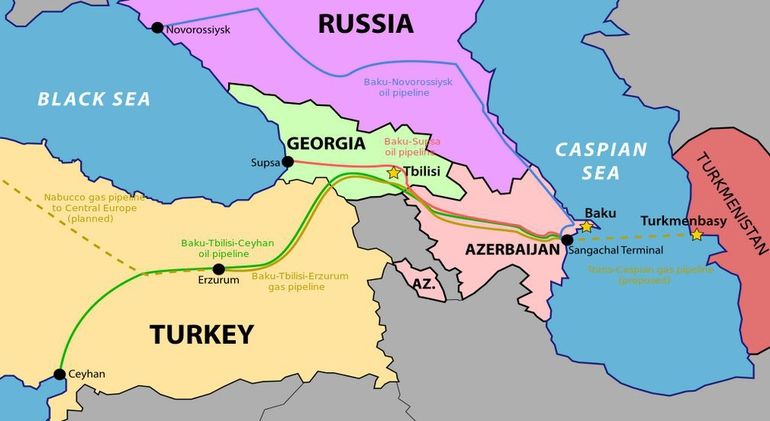Georgia: Russian Army “Shifted” The Border, Taking Over A Fragment Of The Strategic Pipeline
The Russian Army, stationed within the territory of separatist South Ossetia, is used to take over significant areas of the Georgian territory, as a result of a “wild demarcation”. In the recent period, more attempts of shifting the demarcation line were made, through labelling the areas close to the Tsitelubani village (Gori area) with the “border signs”. Due to this operation, a small portion of the strategic Baku-Supsa pipeline which transfers the crude oil between the Caspian Sea and the Black Sea (between Asia and Europe) has been located within the territory of Ossetia.
Zurab Abashidze, a special representative of the Georgian government, dealing with the Georgian-Russian relations stated, in his interview for the Civil.ge outlet, that the activities undertaken by the Russian Army stationed in the separatist South Ossetia became more prominent. Here we mean the illegal erection of the fences which separate the above-mentioned para-republic from the territory controlled by the Tbilisi authorities. As a result of all of these activities, the Russians are gradually partitioning the territory of Georgia. According to the information provided by Abashdze, the Russian Army (again) labelled the areas close to the Tsitelubani village (Gori area) with the “border signs”, by shifting the demarcation line. Due to this operation, a small portion of the strategic Baku-Supsa pipeline which transfers the crude oil between the Caspian Sea and the Black Sea (between Asia and Europe) has been placed within the territory of Ossetia. This is a very important pipeline, also within the context of the initiative realized by the Sarmatia company, shares of which are owned by PERN. The project is to make it possible to export the Azerbaijanian resources, through Azerbaijan, Georgia, the Black Sea, Ukraine (planned route of the Odessa-Brody-Plock pipeline), to Poland (Gdańsk).
Elimination of the Baku-Supsa pipeline would raise the level of significance for another transfer route, i.e. the Baku-Novorossiysk pipeline, referring particularly to the section between Makhachkala and Novorossiysk. Such course of events would mean that the Russians are going to completely monopolize the transfer of the resources from the east to the west, from the strategic Caspian region to the European Union. Such action could also be correlated to other energy-related Kremlin’s initiatives, supported by the Moscow-affiliated regional companies.

Here we mean the idea of creating the Novorossiysk-Supsa pipeline through the separatist Abkhazia. This idea was lobbed in the Georgian media. The pipeline would be connected with the Baku-Tbilisi-Ceyhan pipeline (also known as BTC). This would be beneficial for the Russians in several areas – they would overcome the political isolation of the Sukhumi area, and they would enhance their economic impact in Georgia (at the moment, Rosneft is interested in the Poti oil terminal). Secondly, Russia would neutralize the BTC pipeline which plays a role of “crude oil Nabucco” - i.e. it acts as a strategic pipeline which transfers the Caspian oil to the European markets, excluding the Russian participation. Back in 2008 part of this pipeline was sabotaged by the Russian services. Besides that, a new transfer route could be utilized by Rosneft to provide the resources for the Sardine refinery (there are some rumours that this plant is going to be purchased by the Russians; currently Rosneft has only several some shares within the economic structure of the facility). The above circumstances may also be caused by the fact that the company planned to deliver the crude oil for Italy, with the use of reverse flow in the Baku-Novorossiysk pipeline, and the relevant BTC infrastructure.
The second project which could be realized by the Russians, in the light of elimination of the Baku-Supsa pipeline is the Burgas-Alexandropolis Gas Main. Transneft company indicated that the idea above may be pursued again. The planned large-capacity pipeline would make the crude oil export, carried out by the Black Sea region states, independent from Turkey. The pipeline’s purpose is to send oil through the Novorossiysk terminal which constitutes the oil transfer centre for the Caspian area (Russia, Kazakhstan, Turkmenistan, Azerbaijan).
As we can see, the Russians would gain some significant possibilities and influence, should they neutralize the Baku-Supsa pipeline. It is worth to note the fact that even though the fences erected by the Russian Army within the territory of Georgia are not a new idea, for the first time the activity has an impact on the strategic pipeline which transfers the crude oil between the Caspian Sea and the Black Sea. This may be a proof of increased assertive stance taken by Russia. Moscow is capable of using force in order to realize its energy-related goals. The above is evidenced e.g. by destruction of the BTC pipeline in 2008. BTC route delivered the Caspian resources, with exclusion of the Russian territory.



